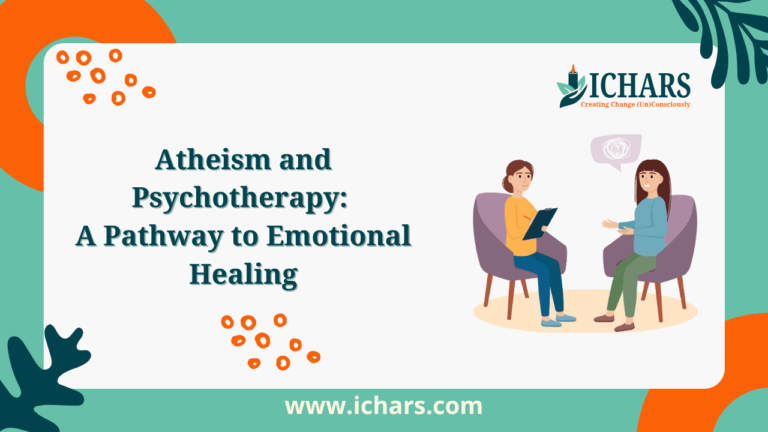Atheism, often misunderstood or oversimplified, offers a rich and profound worldview that rejects belief in deities while embracing a human-centered, rational, and secular approach to life.
For many, atheism serves not as a rejection of meaning, but as an invitation to create meaning in the here and now—through relationships, personal values, and the pursuit of individual growth.
This shift in perspective can have a powerful influence on emotional wellbeing, offering an opportunity to explore and heal without the need for religious frameworks.
In the realm of psychotherapy, particularly Cognitive Hypnotic Psychotherapy (CHP), the integration of atheist principles can provide transformative benefits. CHP, known for its evidence-based, holistic approach, thrives on autonomy, self-empowerment, and critical thinking.
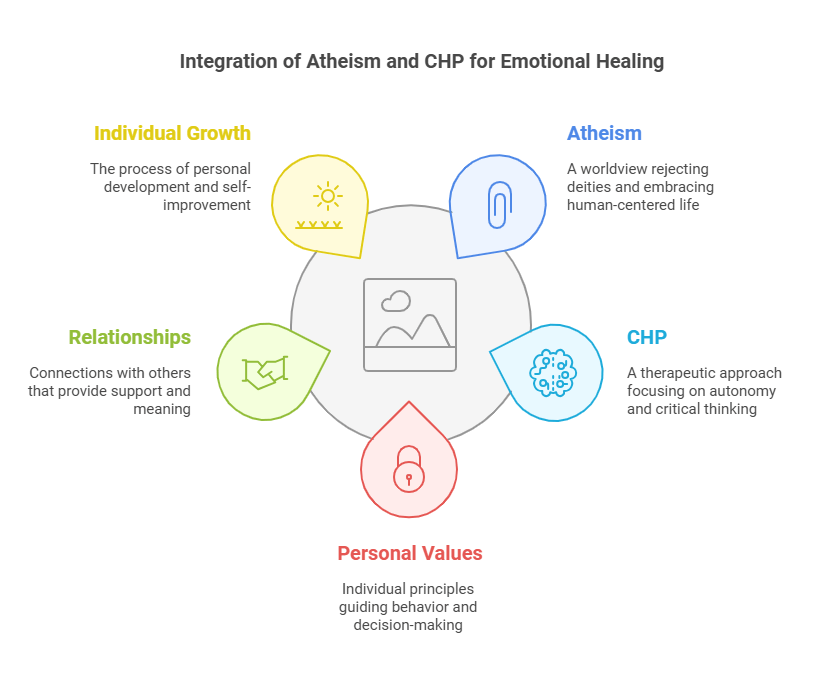
By integrating atheism with this therapeutic model, we create a space where clients can confront their struggles with full ownership, explore their emotional landscapes without fear of judgment, and ultimately cultivate a life that is rich with personal meaning.
This article will dive deeply into the intersection of atheism and CHP, showcasing how this unique fusion fosters sustainable emotional healing.
The Atheist Path to Meaning: A Framework for Emotional Wellbeing
Atheism, often defined as the lack of belief in gods or deities, is more than just a rejection of religious frameworks. It provides a liberating stance on life’s meaning and purpose—emphasizing personal responsibility, critical thinking, and the pursuit of self-determined goals.
For many atheists, emotional wellbeing does not depend on divine intervention or religious faith. Instead, it emerges through human connections, the exploration of personal values, and the active process of meaning-making.
Embracing Personal Responsibility and Autonomy
One of the core tenets of atheism is the emphasis on personal responsibility. In a world without divine orchestration, individuals are seen as the architects of their own lives.
This sense of autonomy is central to emotional wellbeing. It means that individuals are free to define their purpose, set goals, and determine the values that will guide their actions.
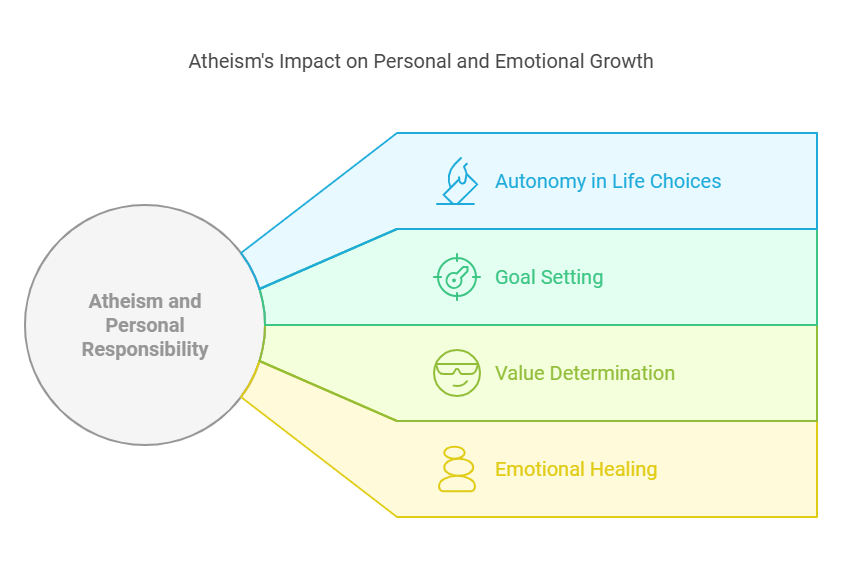
In therapeutic contexts, this principle empowers individuals to take charge of their emotional healing. Atheist clients who adhere to this worldview are less likely to fall into passive roles, waiting for external forces or divine intervention to change their lives.
Instead, they understand that true transformation begins within themselves—through conscious, intentional choices. This can be a vital resource when confronting emotional challenges like anxiety, depression, or grief, where the client’s belief in their own agency is paramount.
Critical Thinking: The Power of Rational Thought in Therapy
Another foundational element of atheism is the emphasis on reason and rationality. Atheists often find solace in the logical exploration of life’s challenges, preferring evidence-based solutions to problems.
In psychotherapy, critical thinking is a transformative tool. It allows clients to examine their irrational beliefs, cognitive distortions, and maladaptive thought patterns—helping them replace harmful perspectives with more grounded, empowering thoughts.
This approach dovetails perfectly with Cognitive Hypnotic Psychotherapy (CHP), which utilizes cognitive reframing, a core technique designed to help clients identify and transform distorted thinking.
Whether it’s challenging negative self-beliefs or confronting unproductive fears, atheists benefit from a therapeutic model that relies on critical, rational thought to bring about meaningful change.
Human-Centered Meaning-Making: Finding Purpose Beyond Religion
Atheism rejects the idea that meaning is preordained or dictated by a higher power. Instead, meaning is something that must be actively created through personal experiences, relationships, and actions.
For atheists, emotional wellbeing is tightly connected to the process of discovering and living in alignment with one’s values.
In therapy, this focus on meaning-making can be particularly powerful. When an atheist client struggles with feelings of emptiness or existential angst, they are not searching for divine purpose; they are looking for ways to create their own.
Cognitive Hypnotic Psychotherapy can help clients uncover new sources of meaning by exploring their passions, relationships, creative endeavors, and goals. These sources of meaning are deeply personal and rooted in the unique experiences of each individual, making them all the more fulfilling.
2. The Psychological Evolution: Atheism’s Influence on Therapy
The evolution of psychology is deeply intertwined with secularism and the shift away from religious explanations of human behavior. Early psychologists like Sigmund Freud and B.F. Skinner introduced ideas that removed divine influence from the human psyche, instead focusing on the material, observable aspects of human behavior. Freud’s work on the unconscious and Skinner’s behaviorism paved the way for a more secular understanding of psychological processes.
This shift set the stage for therapeutic models like Cognitive Hypnotic Psychotherapy (CHP), which integrates techniques from cognitive-behavioral therapy (CBT), hypnosis, and humanistic therapy—all of which are grounded in secular principles. CHP focuses on empowering clients to address their emotional difficulties through conscious thought, self-awareness, and subconscious work, without relying on religious or spiritual explanations.
For atheist clients, CHP offers a comprehensive therapeutic model that respects their worldview while providing the tools needed for profound emotional healing. The approach is inherently client-centered, allowing individuals to explore their emotions and beliefs while providing them with the autonomy to steer the therapeutic process. This makes CHP an ideal fit for those seeking a non-religious yet holistic form of therapy.
Integrating Atheist Principles into Cognitive Hypnotic Psychotherapy
Cognitive Hypnotic Psychotherapy (CHP) is a versatile therapeutic model that incorporates a wide array of techniques from various therapeutic traditions, such as cognitive-behavioral therapy (CBT), humanistic therapy, and hypnotherapy.
When applied through an atheist lens, CHP becomes an even more potent tool for emotional healing. The following are some key atheist principles that align seamlessly with CHP techniques:
The Power of Choice and Autonomy in Therapy
Atheism’s emphasis on personal autonomy and responsibility is fully integrated into CHP, where clients are encouraged to take control of their emotional lives. In CHP, clients are not passive recipients of therapy—they are active participants in their healing process.
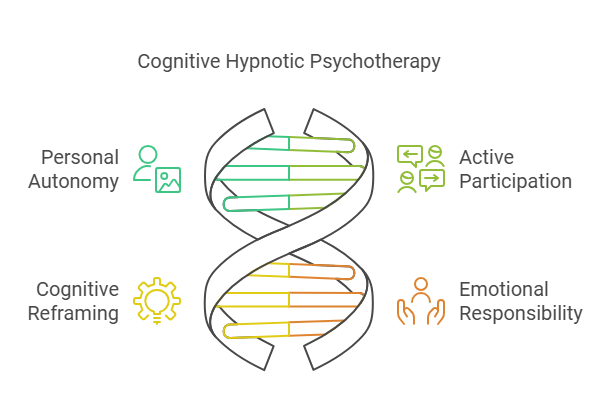
Techniques like cognitive reframing and solution-focused therapy empower clients to take responsibility for their emotions and thoughts, allowing them to become the architects of their transformation.
For example, a client struggling with chronic anxiety might use CHP techniques to identify the irrational beliefs fueling their anxiety and then consciously replace those beliefs with more empowering alternatives.
This process taps into the atheist value of autonomy—recognizing that healing comes from within, through conscious thought and deliberate action.
Rationality and Cognitive Reframing
One of the most powerful techniques in CHP is cognitive reframing, which encourages clients to critically examine and challenge their irrational or negative thought patterns.
This is where atheism’s emphasis on logic and critical thinking aligns perfectly with the therapeutic process. Clients are guided to identify cognitive distortions—such as catastrophizing or black-and-white thinking—and replace them with more balanced, logical perspectives.
An atheist client may, for example, believe that failure in a career venture equates to personal inadequacy. Using cognitive reframing, the therapist helps the client challenge this thought by introducing a more rational perspective: failure is not a reflection of personal worth, but an opportunity for learning and growth.
This process not only alleviates emotional distress but also empowers the client to approach life with greater confidence and resilience.
Hypnotic Regression: Releasing Past Religious Conditioning
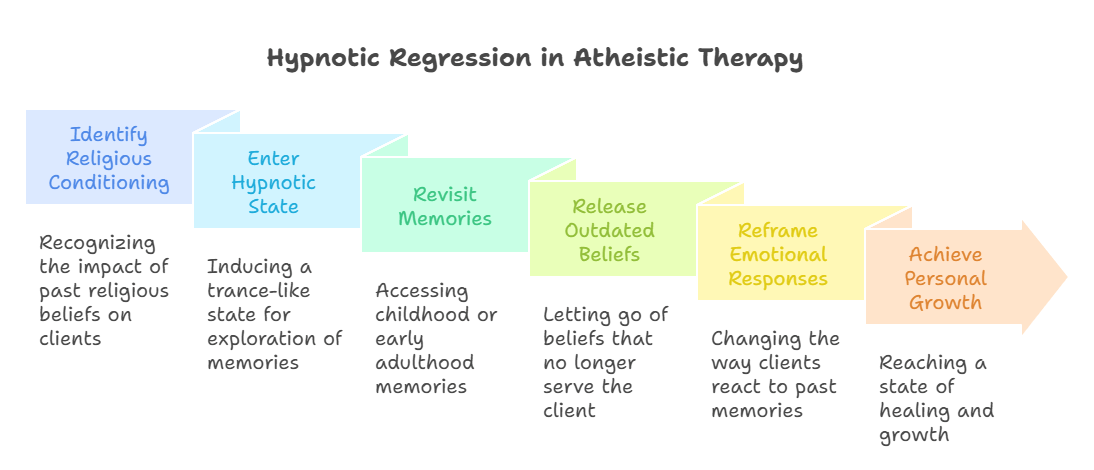
Hypnotic regression, a cornerstone of CHP, is particularly useful for clients who may have been exposed to religious beliefs or dogmas that no longer align with their atheistic worldview.
During hypnosis, clients can revisit past memories or experiences, particularly those involving childhood or early adulthood, where religious conditioning may have caused guilt, shame, or confusion.
By releasing these outdated beliefs, clients can reframe their emotional responses to these memories, fostering healing and personal growth.
Hypnosis provides a safe, non-judgmental space where atheists can confront the lingering effects of religious teachings without feeling coerced into returning to a belief system they no longer identify with.
Addressing Common Concerns and Misunderstandings
Many atheists who seek therapy express concerns about whether their non-belief will be respected or whether religious perspectives will be imposed during the process.
It is essential for therapists working with atheistic clients to create a safe, non-judgmental space where secular values are upheld and respected. A therapist who is familiar with atheism and its core principles can offer a therapeutic environment that feels validating and empowering, rather than alienating.
Moreover, some atheists may worry that therapy, especially practices like hypnosis, might have religious overtones. Cognitive Hypnotic Psychotherapy, however, is rooted in evidence-based practices that are secular in nature.
Techniques like cognitive reframing and hypnosis are applied in a manner that respects the client’s worldview, focusing purely on the psychological, emotional, and cognitive aspects of healing.
Real-World Application: A Case Study
Case Background:
Julia, a 38-year-old atheist, sought therapy after experiencing feelings of purposelessness following the end of a long-term relationship. Raised in a secular family, Julia had always struggled with existential questions about life’s meaning but had never found satisfactory answers in religion.
Her emotional distress was compounded by the belief that she lacked direction and was not living up to her potential.
Therapeutic Process:
Julia’s CHP therapist incorporated atheist principles into the therapeutic process, helping her explore her values, desires, and life goals. Using techniques like cognitive reframing, Julia was able to challenge the belief that she needed to find external validation to feel fulfilled.
Hypnotic regression was used to explore the root of her feelings of inadequacy, which were tied to societal expectations rather than personal values.
Outcomes:
By the end of therapy, Julia reported feeling empowered to chart her own path. She found purpose in her career, rekindled relationships with close friends, and began pursuing creative projects that brought her joy.
Her emotional wellbeing improved significantly, as she was able to align her actions with her true values, without relying on religious or external frameworks.
Conclusion: The Future of Atheism in Psychotherapy
Atheism, when integrated with Cognitive Hypnotic Psychotherapy, offers a powerful framework for emotional healing. By emphasizing autonomy, critical thinking, and human-centered meaning-making, atheistic principles align perfectly with CHP’s secular, evidence-based approach to therapy.
This integration empowers clients to confront their emotional challenges with confidence, self-awareness, and agency.
As the world continues to evolve, it is crucial that psychotherapy remains inclusive and respectful of diverse worldviews, including atheism. By embracing secular, humanistic approaches like CHP, therapists can provide atheistic clients with the tools to heal, grow, and thrive in a world that they have the power to shape.
Through this comprehensive and compassionate integration, atheism is not merely a philosophical stance—it becomes a pathway to deep emotional transformation and a richer, more fulfilled life.
